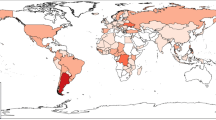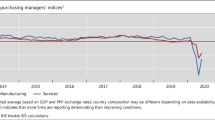Abstract
I want to probe in the role of the market in allocating resources in this very preliminary essay. One does not have to see study deeply to that the failure of markets for various kinds of derivative securities to perform properly is an essential element of the current financial crisis. Actually, financial crises are not a new phenomenon. The history of capitalism has been marked by repeated collapses of the financial system, situations in which the “markets” for loans disappear for extensive periods of time. The 18th century saw some bubbles, but these might not be quite modern. But from 1819 on, there have a succession of failures of banks and other financial institutions. These have typically been unpredicted and did not correspond in time to any particular exogenous event (e.g., wars). Economists from Joho Stuart Mill (1848) on did recognize the phenomenon. But the discussion was and is not at all integrated with the general exposition of classical economics. No one could be a more vigorous advocate of unrestrained markets than Milton Friedman; yet, to my reading, the account that he and Anna Schwartz gave of monetary developments in the United States and particularly with regard to the Great Depression emphasizes, not prices, not even interest rates, but the supply of money, and, by inference, of liquidity. (Friedman and Schwartz (1963)). I start with the neoclassical general equilibrium framework, to which I have given a good deal of attention and effort. I seek to identify a possible point at which it fails to supply a coherent theory of securities markets and so might possibly lead to some understanding of the repeated crises of the financial system underlying the development of capitalism.
Similar content being viewed by others
References
Arrow, K. J. (1953). Le role des valeurs boursieres pour Ia repartition Ia meilleure des risques. In Econometrie, Colloques Internationaux du Centre National de Ia Recherche Scientifique, XI, 41–47.
Arrow, K. J. (1963). Uncertainty and the welfare economics of medical care. American Economic Review, 53, 941–973.
Arrow, K. J. ([1963-4]). The role of securities in the optimal allocation of risk bearing. Review of Economic Studies, 31, 91–96. English translation of Arrow [1953].
Arrow, K. J., & Debreu, G. (1954). Existence of equilibrium for a competitive economy. Econometrica, 22, 265–290.
Debreu, G. (1959). Theory of value (pp. 1867–1960). New York: Wiley.
Friedman, M., & Schwartz, A. J. (1963). A monetary history of the United State. Princeton: Princeton University Press.
Hicks, J. R. (1939). Value and capital. Oxford: Clarendon.
Kane, E. J. (1989). The high cost of incompletely funding the FSLIC shortage of explicit capital. Journal of Economic Perspectives, 3, 31–47.
Laffont, J.-J., & Martimort, D. (2002). The theory of incentives. Princeton: Princeton University Press.
Mill, J. S. (1848). In W. J. Ashley (Ed.), Principles of political economy (7th ed.). London: Longmans, Green and Co.
Walras, L. (1874, 1877) Elements d’economie politique pure. English translation by W. Jaffe, 1954 Elements of Pure Economics. Homewood, ill.: Irwin.
Author information
Authors and Affiliations
Corresponding author
Additional information
This article is based on the Keynote Speech of Beijing Forum, Diaoyutai State Guest House, November 6, 2009.
Rights and permissions
About this article
Cite this article
Arrow, K.J. Economic theory and the financial crisis. Inf Syst Front 14, 967–970 (2012). https://doi.org/10.1007/s10796-012-9370-0
Published:
Issue Date:
DOI: https://doi.org/10.1007/s10796-012-9370-0




